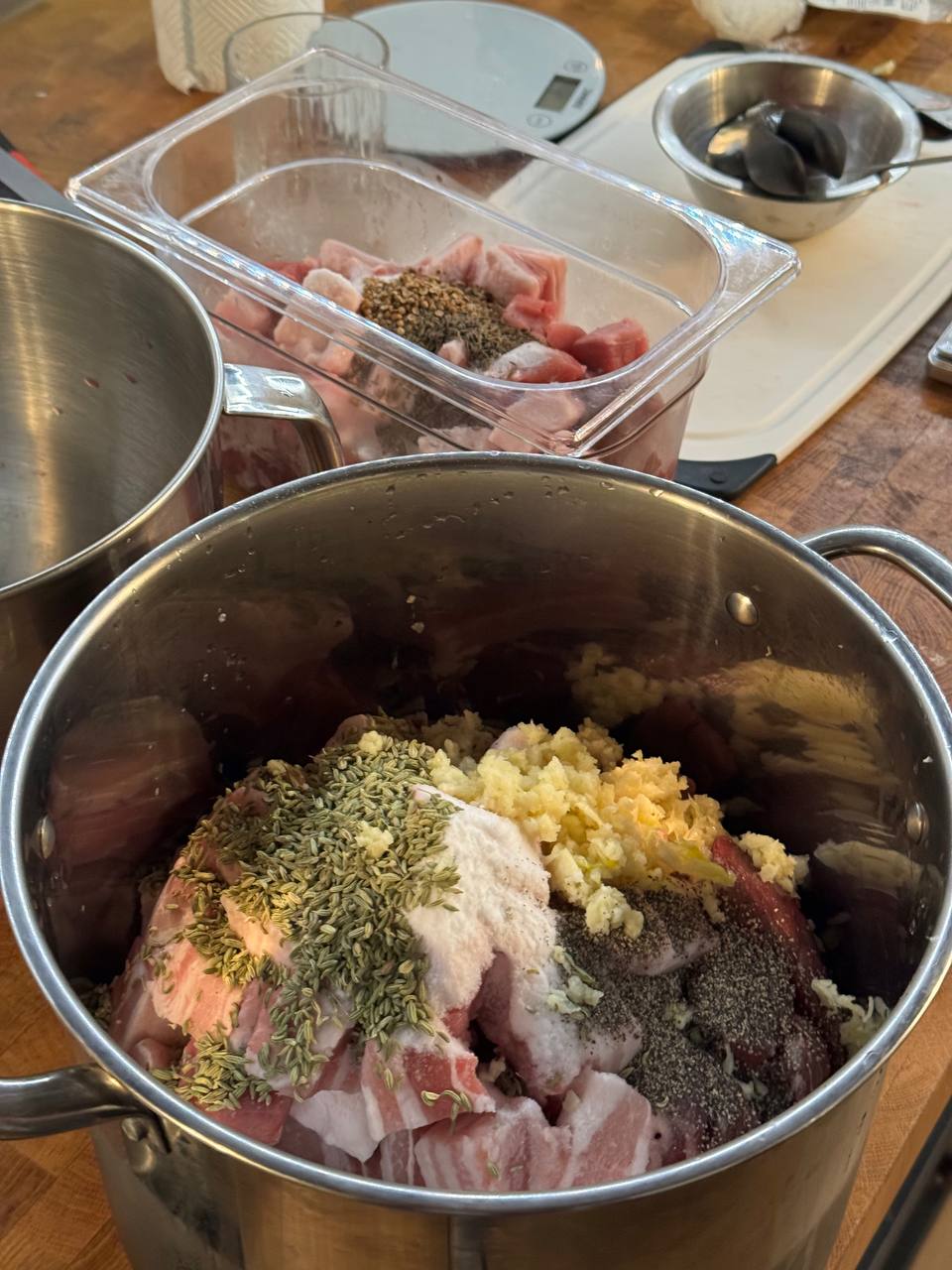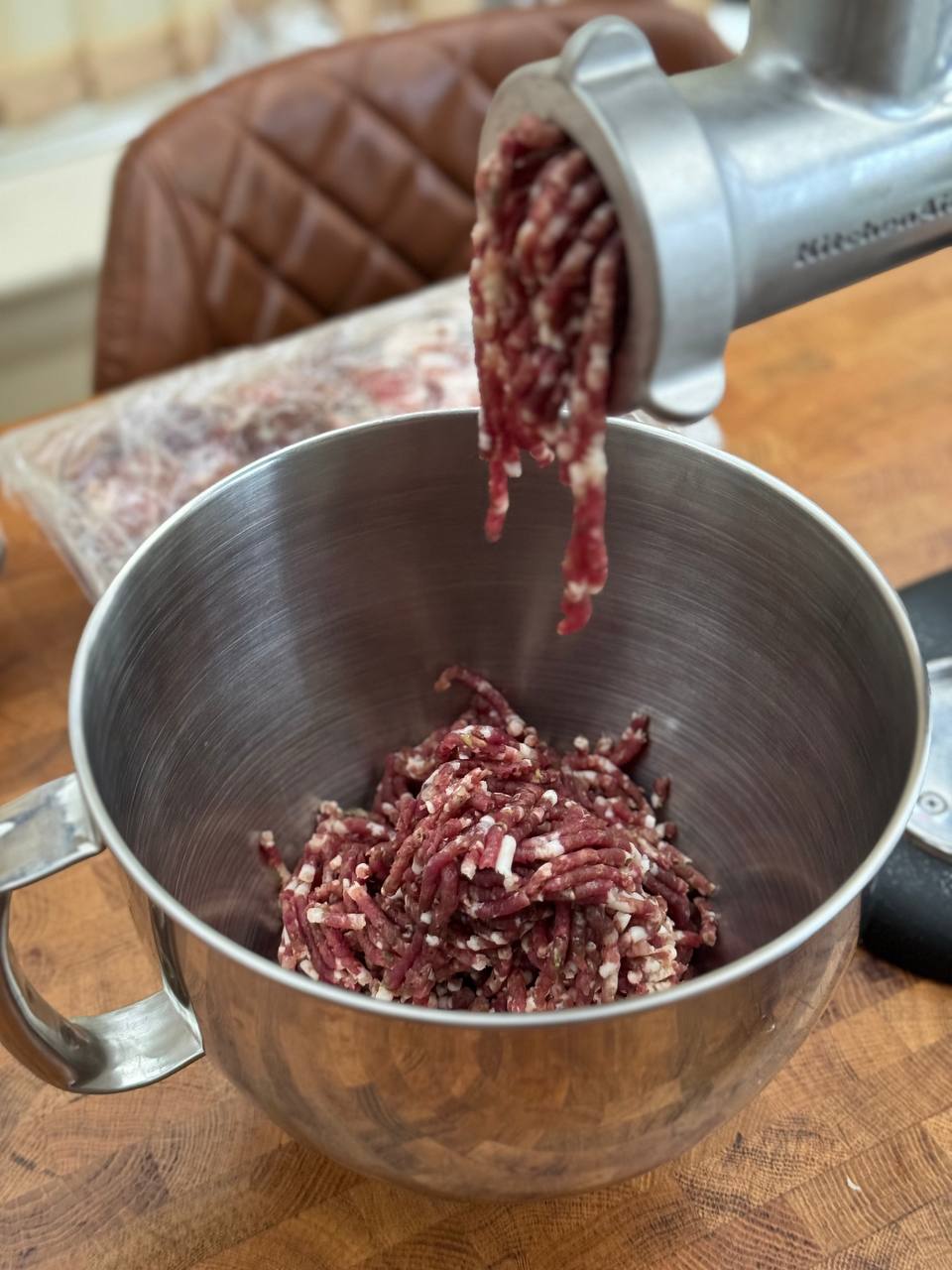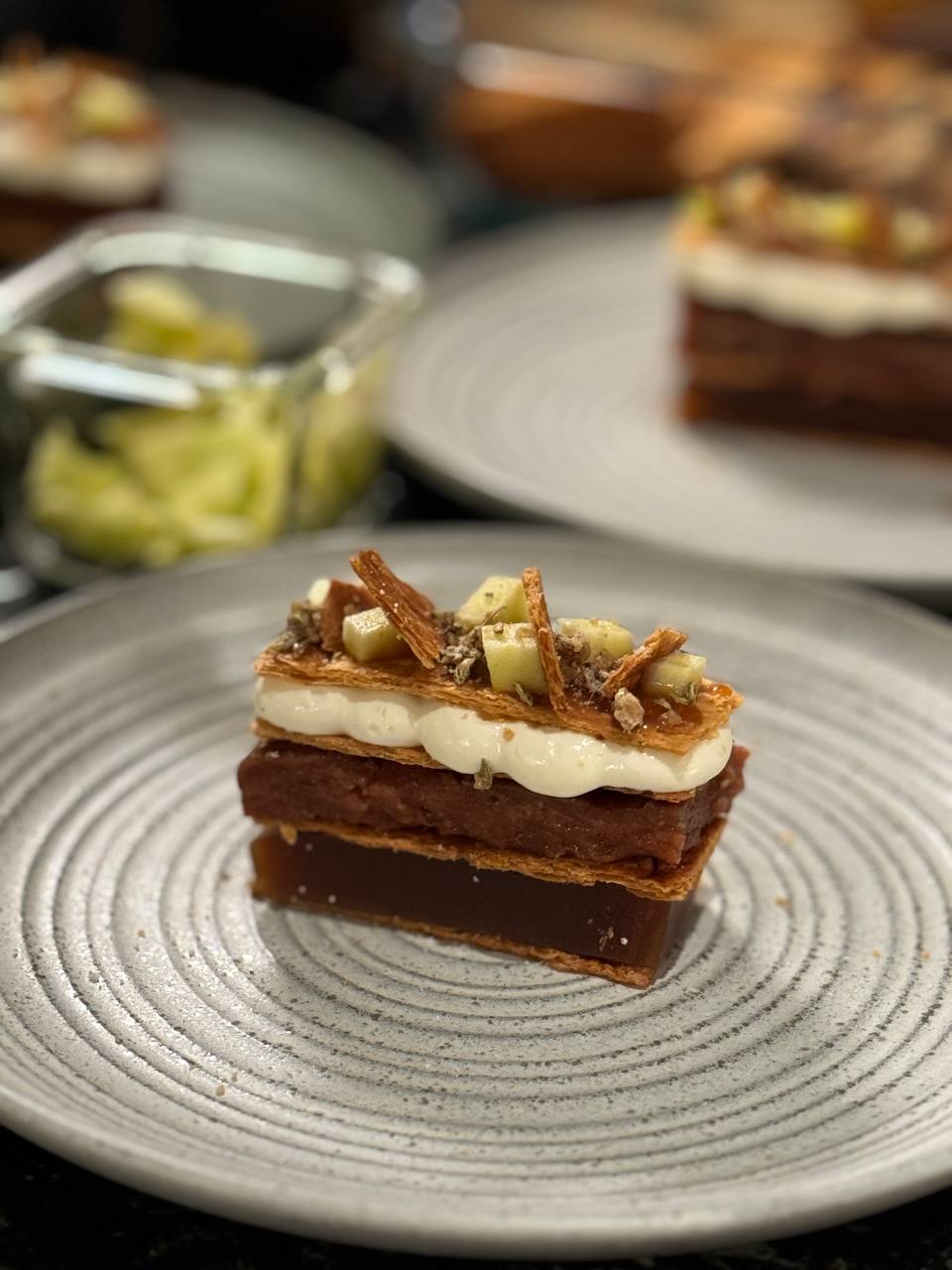#172
On making charcuterie
Last week I shared a sneak peek of my upcoming cooking projects as I was butchering a whole roe deer carcass, and some of the trims were later mixed with lots of spices, some wine, and salt, and left to infuse overnight.

Next day I ground the meat alongside some pork fat and mixed it with a culture:

And then stuffed it into hog casings. Half of the sausages are inspired by a classic saucisson sec, and a half is a riff on "hunter's sausage" aka landjager.

Landjagers got briefly cold smoked, and then I hanged everything in the garage, which seems to be at the right temperature and humidity levels:

The sausages will need to loose lots of moisture reduce by 30-50% of their weight, so I will report back in a few months.
Meanwhile, Sasha is treating me to a modern take on an apple arlette dessert, using apples from a local orchard:

Just look at these layers!
Enjoying this? Get Tuesday Triage in your inbox every week.
Things I enjoyed reading
1. The product manager role is a mistake by @sollecitom
It's hard to be bright, and especially hard to be bright in a corporate environment: mediocre people tend to be afraid of passion, and won't rest until the status quo is restored.
These people were artists, mathematicians, inventors, scientists, CEOs, and often more than one of these at a time. Do you know what else they had in common? None of them were motivated by OKRs, KPIs, data, or other people’s opinion. They were obsessed by their vision and craft. In an all-consuming, totally uncompromising way: anything short of perfection was inconceivable to them.
Tremendous people also tend to have very strong opinions, a big ego, their way of doing things, rough edges, and a disdain for mediocrity. They’re borderline unemployable, and they likely wouldn’t want to work in most companies. To them, it’s about creating something extraordinary for the sheer pleasure of it. And that’s why they disregarded work-life balance: their craft is their biggest joy. Imagine asking Michelangelo not to sculpt the back of a statue because the customer wants to put it against a wall.
Throughout my career I was lucky enough to work hand-in-hand with some tremendous people and learnt to appreciate rough edges as much as started to hate mediocricity.
Many good things eventually end, and corporate cultures usually prevail, but the ideas these people bring never fully disappear.
2. Confessions of a Tableside Flambéur by Adam Reiner
I am not a big fan of theatrics anywhere near my plate, even if it's a fancy restaurant, and partly because it's nearly impossible to make a good picture of the plate with someone's hand pouring a sauce over the tiny slice of steak. It's interesting to learn how it feels from the other side of the process:
I used to resent diners shooting video of me tossing Crab Louie salads, fileting whole Dover soles, or flipping wild mushroom omelets cooked in black truffle butter. I’d often wonder how those same people would feel if a client randomly shoved a phone in their face to film them going about their business at the office, like reviewing a tax document or drafting a legal brief. Over time, I learned to accept that exhibitionism comes with the territory. Today’s diners seek out restaurants for entertainment — the food is often secondary — and the restaurant owners seem more than happy to oblige. Whether we like it or not, the staff are considered part of the show.
I do understand the high demand for it though: many people struggle to remember the flavours, and never write down compositions of their dishes, so the only thing left are those sketchy videos of waiters setting their crepes on fire.
3. Learn a Foreign Language Before It’s Too Late by Douglas Hofstadter
With the current advancement of LLMs and AI we're probably only a few years away from gadgets capable of translating audio and mimicing voices live, both offline and simultaneously. Which is probably sooner than I'd be able to grasp a decent understanding of any new language, whether it's Hebrew or Italian.
When I was in the roughest times in my endless battles with the Chinese language, I often wished that I could just get an injection that would make me perfectly fluent in Chinese in a flash. How wonderful it would be to be able, at last, to understand everyone around me, to say anything I wanted to say, and so on! But when I thought about it for only a few seconds, I realized that after getting such an injection, I would not feel proud of having learned Chinese by struggling for many years. My instant fluency in Chinese would, in that case, be a trivial acquisition rather than a precious goal obtained thanks to immense hard work. It would mean nothing to me, emotionally. It would be like arriving at the summit of Everest in a helicopter.
I'd probably still give a go to learning a language. Partly because those translating gadgets would have a terrible battery, and partly because talking to a phone and then waiting for a reply works well for checking into a hotel, but doesn't not work at all when it comes to asking a bartender about your cocktail's spec in a noise bar.
4. How to Exclaim! by Florence Hazrat
Many modern texts either lack many punctuation marks (when was the last time you saw a semicolon?), or use emoji for anything more complex than a question mark. It doesn't make them harder to understand, but it does change the way texts feel:
The exclamation point falls flat. All the expectation and excitement rushing into the uplifting mark, and then—nothing. The marling keeps on swimming for another 100 pages. This punctuation tsunami lifts itself out of nowhere and goes nowhere. Hemingway plays tricks on our feelings with this exclamation anti-climax, standing starkly out as the only ! in the novel, just as the rest of the lonely 59 exclamation points dotting Hemingway’s entire works. !‘s presence can produce big emotions. And so can its absence.
As a non-native speaker I always struggled with any punctuation more complex than dots but that's probably down to my eductation: I once asked our English teacher if we will ever learn how to properly use commas and she was like "do learn the language instead lol".
And here we're now.
5. Leaving Twitter by Benedict Evans
I joined Twitter in 2009, almost fourteen years ago, and it played an important role in both my career and personal life, and yet I haven't really posted anything meaningful there for more than a year (and probably won't ever again).
Even though these days it's common to blame Elon Musk for the platform's decline, to me it started way earlier, when the product stagnated and just turned to odd monetization attempts and weird community features, but obviously Musk's involvement didn't make things any better:
There are various diagnoses for this. Tesla has sometimes been run in chaos as well, but the pain of that is on the employees, not the customers: you can’t wake up in the middle of the night and decide the car should have five wheels and ship that the next day, but you can make those kinds of decisions in software, and Elon Musk does, all the time. Perhaps it’s a fundamental failure to understand how you run a community. Or something else. But whatever the explanation, Twitter now feels like the Brewster’s Millions of tech - ‘Watch One Man Turn $40bn Into $4 In 24 Months!’
I am curious to see the next big player in the field. Back in 2019-2020, in the late years of Sphere, we tried to build something for communities of the future and it never really took off (I also liked the early Sphere way more), but Reddit and Discord are not the answer either.
6. Taste of a decade: the 1990s by Jan Whitakar
I am a firm believer that history is somewhat looped, so learning food trends of the past is a good way to get prepared for the tasting sets to come:
As the economy improved it became clear that luxury restaurants hadn’t vanished. The December 1990 announcement that the James Beard Foundation was forming an awards program was a sign that top chefs were not to be forgotten. Yet, despite the boost to fine dining given by the awards, fine-dining establishments continued to struggle.
New, artsy trends in plating meals emerged, among them the brief but dramatic art of stacking food into towers that wowed the eye but proved difficult to eat gracefully.
I am not looking forward to food stacked into towers though (unless it's a Zinger Tower burger from KFC).
7. 15 Years Later, Twilight Is Still Weird as F*ck by Brady Langmann
And as I talk about the previous decades, whether it's food or Twitter, here is another nostalgic milestone:
I'm not sure if it quite hit this way in 2008, or if everyone couldn't see anything from their shutter shades, but Twilight is a really f*cking weird movie! It's less of a film, really, and more of a sequence of moving images that are sad and silent and CGI and baseball game, but also really horny?
I thought the first movie was quite appaling, but eagerly went to a cinema to watch the second just for the laugh of it, and it was hilariously bad. Recently I got to watch short bits of a few parts (someone in our household decided to bring back their 2008) and it's as bad as I remember, so at least I am not anywhere close to changing my taste in movies which is a relief.
8. The mystic art of gardening by Caleb Smith
Who would have thought that landscape design in general and gardening in particular holds answers to so many philosophical questions?
Longleat’s gardens were remodelled once again in the 19th century, this time by adding what Page called a ‘profusion of exotic trees and shrubs’ imported from around the empire. Such abundance displayed Britain’s global power, but Page didn’t like it. English design, he felt, had fallen victim to its own imperial excesses. Gardeners collected exotic plants and ornaments, like tourists buying souvenirs, then jumbled them together. There was too much material, not enough focused intention. Good design, in Page’s eyes, called for some restraint.
The same could be applied to many other things, from food to mobile apps. I, for one, always repeat that constrains are a good thing. Otherwise you'd have to read through fourty articles every week and not ten.
9. why every microwave sucks these days by Chesapeake
Right, so first things first, I reckon it must be hard to write without capital letters. Many modern devices forcefully capitalize characters in new sentences. As the result, I treat it like a modern age protest against capitalism.
there is no growth to be had in selling microwaves. nobody is rushing out to buy the hot new microwave. there is no TikTok trending microwave with revolutionary new smart features. the only reason anyone would ever consider buying a microwave is because they moved into a new place that didn't already have one, or their old one broke. you probably don't even look at what the box says, because they're all the same, and they all have that "popcorn" button which doesn't work for some reason.
It's a good point though: there are no reasons to make something so good that you can't innovate more. This is why so many people are genuinely concerned about Apple's future now, when their laptops are already times and times better than the competitors'.
10. Without a Trace: How to Take Your Phone Off the Grid by Monique O. Madan and Wesley Callow
This is obviously a purely hypothetical experiment, but what would you do if you ever wanted to get a mobile phone impossible to trace?
Post-setup, disable Bluetooth. This is important because Bluetooth signals can be intercepted by third-party devices within range, and that allows hackers to access sensitive information, such as your phone’s contacts and messages. The throwaway Proton Mail email address plays another vital role, acting as the gateway to access Proton, a virtual private network (VPN) that masks all phone application traffic.
I reckon way easier would be to by a burner phone at a gas station, but then you can't really use emails, unless there is a gateway that could convert them to SMS messages.
Did you know I make apps?

Constellation
I wanted to walk through my Obsidian vault in VR. So I built it. Your notes become stars, your links become constellations.
Take a look →Things I didn't know last Tuesday
1. Kale pulling
As it's the Halloween night I couldn't miss a chance to learn more about Scottish traditions, and this whole post from National Trust for Scotland is quite good, but this one is probably the most hilarious:
This hearty green vegetable is now a fashionable menu item but, once upon a time, kale stalks were used to predict your romantic future. In Robert Burns's poem ‘Halloween’, people pull stalks from the ground after dark with their eyes closed. The length and shape of the stalk was said to represent your future lover’s height and figure, and the amount of soil around the roots represented wealth.
It also seems like here kids are expected to tell a joke or a poem, not just get sweets because their parents got them a costume. I can't really confirm or deny this as I didn't partake in the activities, but at least I know what to expect.
2. Darién Gap
The quote doesn't mention who was heavily investing in the development of the area, but apparently that was Scotland:
The "Gap" interrupts the Pan-American Highway. Some 106 km (66 mi) of this between Yaviza, Panama, and Turbo, Colombia, has never been built. Road-building in this area is both expensive and detrimental to the environment. Political consensus in favor of road construction collapsed after an initial attempt failed in the early 1970s, with a proposal in the early 1990s halted by environmental concerns.
Seems kind of far from Edinburgh though, and I also had no idea Scotland had interests in any foreign countries.
3. Flannelette
The overall story is about the danger of lights in theatres and overall issues of fabrics that were too flammable. However, the way the fabric is done here is also quite unusual:
At the end of the 19th century, “flannelette,” a mimic of flannel made of cotton instead of wool, became popular because of its low cost and comfortable feel. It was made by subjecting the surface of the cotton fabric to rollers covered with sharp steel wire to produce minute fluffy fibres that trapped air and created a warm, cosy feel. But the trapped air in contact with the thin fibres set the stage for disaster. Many a child wearing floor-length flannelette sleeping gowns, like those worn by the Darling children in Peter Pan, became victims of an epidemic of burns as their apparel was ignited by the flame of a candle or the sparks from a fireplace.
That's quite sad though, especially given that it wasn't a single incident, and yet no one though of changing the laws or ways the scene is presented.
4. Pigging
For all those James Bond fans, now you know how it's called:
In pipeline transportation, pigging is the practice of using pipeline inspection gauges or gadgets, devices generally referred to as pigs or scrapers, to perform various maintenance operations. This is done without stopping the flow of the product in the pipeline.
I wonder if one pig gets stuck in the pipe (it sounds hilarious), do they send in another one? Does it actually help?

5. Heslington Brain
The preview looked like an odd brownie, but it's sadly not:
The Heslington Brain is a 2,600-year-old human brain found inside a skull buried in a pit in Heslington, Yorkshire, in England, by York Archaeological Trust in 2008. It is the oldest preserved brain ever found in Eurasia, and is believed to be the best-preserved ancient brain in the world.

I wonder what happened to make it so well-preserved for so long.
6. "Due dita di vino e una pedata al medico"
In addition to last week's Italian proverb, here is another one.
Italian saying: A little wine kicks the doctor out the door (due dita di vino e una pedata al medico).
American translation: An apple a day keeps the doctor away.
I really love how in English people think that apples are healthy, while in Italy it's only wine. Poor doctors.
7. Box-bed
If Harry Potter was French, he'd probably live in something like that:
A box-bed (also known as a closed bed, close bed, or enclosed bed; less commonly, shut-bed) is a bed enclosed in furniture that looks like a cupboard, half-opened or not. The form originates in western European late medieval furniture.

It doesn't look like an efficient storage solution though, partly because the roof could be used as a shelf too but it's not.
8. Thokcha
Looks like a cool jewelry:
Thokcha are tektites and meteorites which serve as amulets. Typically high in iron content, these are traditionally believed to contain a magical, protective power comparable to Tibetan dzi beads.
The ones sold online look fake though, which kind of makes sense.
9. Wine in French school canteens
Seems like France was a cool place to study at less than a century ago:
In 1956, France also banned the serving of alcohol to children under the age of 14 in the school canteens. Prior to that, school children had the right to drink half a litre of wine, cider or beer with their meals. It was only in 1981 that France implemented a total alcohol ban in the country’s schools.
I wonder what happened though, and how kids managed to study constantly drunk.
10. Gooning
That's my weekly reminder that America is a wonderful country with a hilarious selection of laws:
Gooning is a form of legal kidnapping, occurring predominantly in the United States, in which parents hire rehabilitation organizations to seize children they perceive as troubled and transport them to boot camps, behavior modification facilities, residential treatment centers, substance abuse treatment facilities, wilderness therapy, or therapeutic boarding school. In most cases, the organizations send a group of people to show up by surprise and force the teenager into a vehicle, often under cover of darkness.
That's not a thing in the UK though.
Book of the week
I got a few app ideas in mind, which is not too unusual, but this time I actually have some motivation to see them released in App Store, so one of my first steps was to free up the time – and to find a spare few hours a day for writing code I naturally read a book on better focus and just stopped wasting hours on Instagram.
Not sure if it's the result of reading Cal Newport's Deep Work, or just my personal willpower (and the fact that I have 8 hours a day of screen time), but here we are:
If you find yourself glued to a smartphone or laptop throughout your evenings and weekends, then it’s likely that your behavior outside of work is undoing many of your attempts during the workday to rewire your brain (which makes little distinction between the two settings). In this case, I would suggest that you maintain the strategy of scheduling Internet use even after the workday is over.
To simplify matters, when scheduling Internet use after work, you can allow time-sensitive communication into your offline blocks (e.g., texting with a friend to agree on where you’ll meet for dinner), as well as time-sensitive information retrieval (e.g., looking up the location of the restaurant on your phone). Outside of these pragmatic exceptions, however, when in an offline block, put your phone away, ignore texts, and refrain from Internet usage. As in the workplace variation of this strategy, if the Internet plays a large and important role in your evening entertainment, that’s fine: Schedule lots of long Internet blocks. The key here isn’t to avoid or even to reduce the total amount of time you spend engaging in distracting behavior, but is instead to give yourself plenty of opportunities throughout “your evening to resist switching to these distractions at the slightest hint of boredom.
One place where this strategy becomes particularly difficult outside work is when you’re forced to wait (for example, standing in line at a store). It’s crucial in these situations that if you’re in an offline block, you simply gird yourself for the temporary boredom, and fight through it with only the company of your thoughts. To simply wait and be bored has become a novel experience in modern life, but from the perspective of concentration training, it’s incredibly valuable.
The book is not about social networks by the way, it's more like a guide on learning how to focus without distraction on demanding tasks, and the most important part of it is in setting tiny rituals and routines that could help you to avoid those distractions, so you won't even need much of willpower to concentrate.
I often find self-improvement books quite pressing: they demand you to follow the steps or else, but this one feels quite different.
Now let's see if I can wrap up a public announcement of my first indie app in half a decade by the next public newsletter.
Thank you and see you in a week
(or in a month)!
If you'd like to support the newsletter, please subscribe to the weekly plan. Otherwise you will keep receiving the letters on a monthly cadence – no need to do anything to opt-in.
If you have any questions, or want to suggest a link for the next newsletter, please drop me a message on Twitter or reply to this email.
Cheers! 🍸
Need help with iOS?
I spent a decade on FDA-regulated medical devices and apps with millions of users. Now I help teams ship MVPs, rescue messy architectures, and build the hard bits that don't fit in a sprint.
Learn more →